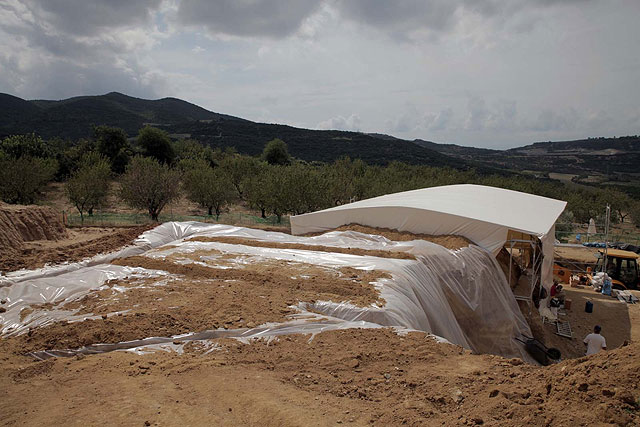Photos - personal archive of Diana Dimitrova and Ministry of Culture of Greece
- Could you take us back in history and remind us of the relations of Seuthes III with the Macedonian kings?
- Their relationships were quite complicated. He had to survive, to protect his territory in a complex situation after the death of Alexander the Great, when his successors divided the great Macedonian state between themselves. Lysimachus, the successor to Alexander the Great in Thrace, had appetites to bring the whole territory under his control and Seuthes III had to comply with some diplomatic relations but also to "grit his teeth" sometimes, if I could put it in a more popular way. He was defending his territory, although in the last quarter of the 4th century BC the Odrysian kingdom was much smaller than in the early 4th century BC, at the time of Cotys I. Seuthes III was defending his territories. Sometimes he entered in alliance with Lysimachus, but sometimes with the Greek cities on the Thracian coast, including Amphipolis. He allied with them against Lysimachus not because he was such by nature but because he had to defend the interests of his country and its people. If he was not flexible, did not comply with the circumstances and did not enter in alliance with those who were powerful he had no chance of surviving. Therefore, the relations with Lysimachus were complex, they were not straight and smooth and sometimes he had to fight with him.
- As for the tomb in Amphipolis, there are still doubts that it may have been visited by treasure hunters. Did you have such doubts about Golyamata Kosmatka? How do you think archaeological sites can be protected from treasure hunters?
- Golyamata Kosmatka was defiled by neither modern nor ancient treasure hunters. However, this is an exception. As for Amphipolis, it is seen that either modern or ancient treasure hunters have taken some of the gifts but because the excavations are not yet finished I would not like to comment on them. The issue is that the state must apply very strict sanctions against treasure hunters. It is not enough to have them in a law. We have a law. The point is that they should be applied in order for treasure hunters to know that they cannot ruin the national and global wealth unpunished. This is because neither Amphipolis belongs to the Greeks alone nor Golyamata Kosmatka belongs to the Bulgarians alone. These are monuments of world importance and I am fascinated by the Greek state that has quickly assumed possession of its property.

A beautiful shed has been built there. Yes, it slightly spoils the look of the facility itself, it is better to take photographs without the shelter, but it will protect it from the weather, at least at first. Moreover, it is nice and beautiful, although it was built quickly. This is something we build alone in Bulgaria, upon finding such facilities we put above some structure to protect them. Obviously, the Greek state very firmly and steadily supports archaeology. Something I would like to happen in Bulgaria too.
- By the way, in the middle of August the site was put under a 24-hour police protection. No one can enter it just like that. The Greek Prime Minister went to the site to be informed of the excavations and the requirements of scientists. The information that reaches the media is very regular and highly channelled. The pictures are official, they are taken by archaeologists who are on site and published every two-three days on the site of the Greek Ministry of Culture. The same applies to the information on the progress of the excavations.
- I congratulate the Greek state and the Greek colleagues for putting things in order, which is very difficult. You cannot imagine how hard it is to do your job when people come to you in half an hour saying, "Tell me now for this issue." Of course, without journalists, no one will be aware of our work but an archaeologist cannot do his or her job if subject to such media attention. I congratulate the Greek state for this order because it allows archaeologists to professionally do their job and obtain the most information from the site they have the chance to explore. I hope that later, once its exploration has been completed, we will be able to visit it too, as tourists, of course. I wish my colleagues from the bottom of my heart and soul that the last chamber is not robbed.